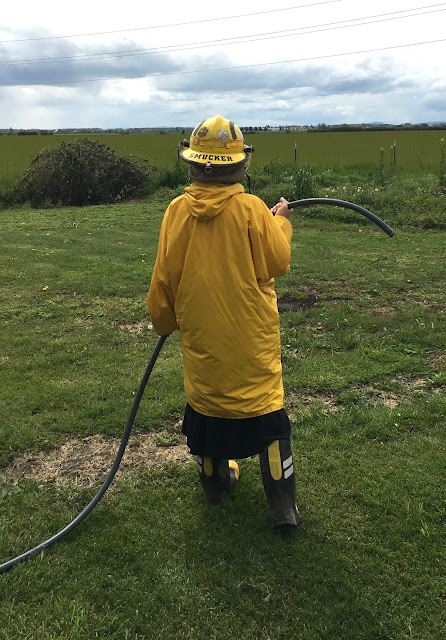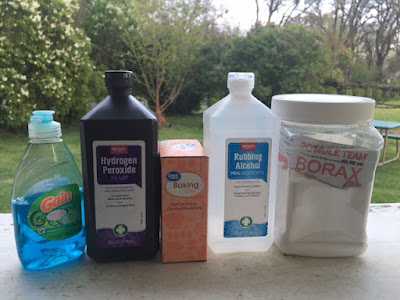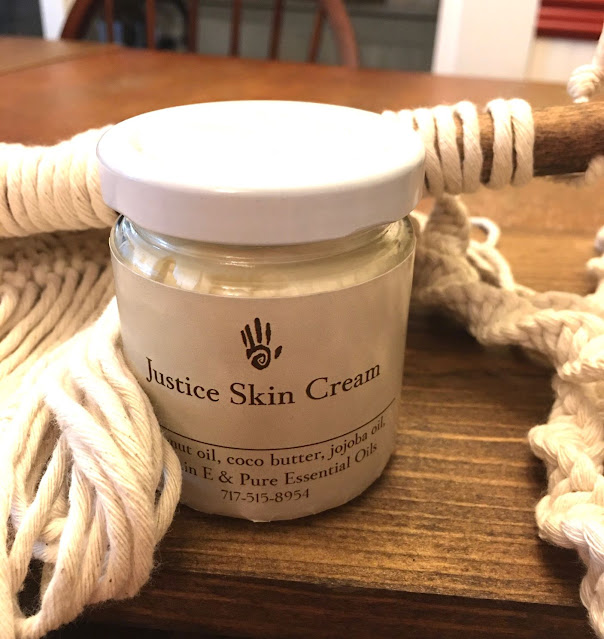This is the second post addressing this question:
Dear Aunt Dorcas—
I have five small children, and I get really frustrated with
the pressure on young moms to use certain cleaning and health products, usually
from MLMs like Norwex or DoTerra. I’m part of a few big chat groups with
Mennonite moms, and most of the vocal women on such platforms tend to send the
subtle implications that a good mother should be always looking for better
health, better cleaners, and better hairspray. And I feel like a freak for just
thinking a clean scalp is what’s most important. I’m doing good if I can pick
up detergent or shampoo at Walmart. One day I decided to ask the group if I’m
as unusual as I feel like I am. I thought maybe there’s other moms out there
like me. But the admins deleted my question! So then I really felt like a
freak. Do you have any advice for me?
--Kayla
 |
| Aunt Dorcas plunges back into a fiery topic. |
Let's talk about peer pressure.
Moms are probably the most passionate people on the planet.
Having babies brings out the mama bear in all of us, and everything matters. We
want only the best and safest for our babies, which makes us fierce and often vocal
about many subjects.
Moms also observe what other families are doing, and
sometimes their [our] passion for the Right Way To Do Things leads them to be much
too interested in what everyone else is doing. Not only do they judge other
families, they speak their opinions out loud.
Worst of all, they lose track of what is their business and
what is not.
The particular issues come in waves. Suddenly everyone is buzzing
about a topic and has a strong opinion. Then that wind blows itself out,
another takes its place, and people look back and think, “I can’t believe she
got after me about that.”
Back when homeschooling first gained popularity, you either homeschooled,
or you didn’t. People camped on one hill or the other, ready to die there. You
had to be ready to defend your educational decisions, because someone was bound
to ask you exactly what you were doing and preach at you why that was wrong.
Particularly with Covid, homeschooling has become much more
of a fluid endeavor. Public school students stayed home and connected online,
and private schools had a wide variety of responses. Families often formed co-ops or pod schools.
People don’t seem to be quite as concerned any more about
what everyone else is doing. Instead, they’re trying to figure out what works
for their children, picking among many options.
That is as it should be. Other people’s education choices
are not your business.
Other subjects that used to be the source of intense
pressure in my young-mom days included birth control, natural childbirth, home
vs. hospital births, breast vs. bottle feeding, putting babies on a four-hour
schedule, cloth vs. disposable diapers, learning-to-read curriculums, discipline
methods, Home Interiors products, and anything related to Bill Gothard’s
teachings.
A sweet Christian woman sat down with me one evening and tried to convince me that we should
follow Bill Gothard’s monthly schedule for having sex, which included not using
contraceptives. She told me how rewarding this was for her and her husband and
wanted to know if we followed it. God help me, I didn’t have the skills to tell
her this was Not Ok. I just sat there squirming and horrified.
I hope you’re also horrified. I’m also guessing that you’re
thinking, of all these subjects: That is no one’s business but your own! Why
would ANYONE think they had any right to not only ask what you did, but tell
you what to do?
Thirty years from now, that’s what you’ll think when you
remember that moms used to pressure each other about essential oils, Lemongrass
Spa, and Amway L.O.C. And about vaccines, gentle parenting, organic food, Windex,
fantasy books, and candy.
[Disclaimer #1—if children show up at your house or Sunday
school with bruises and lice, then it becomes your business, and you need to
speak up. The occasional lollipop or screen or synthetic garment or GMO or
Suave hair spray, not so much.]
I didn’t have the strength or the skills, back then, to tell
opinionated people that I don’t discuss these subjects. I didn’t realize they
were crossing normal social boundaries. Instead, I felt left out, guilty,
confused, resentful, unspiritual, and really weird, like there was something
wrong with me.
Some of you enthusiastic product promoters are thinking, “I
would never put pressure on anyone! I just like to talk about this because I
believe in it, but they can decide whatever they want.”
Trust me, there are people like Kayla the letter-writer and shy, sensitive women in your circle who
feel left out, guilty, confused, resentful and unspiritual, but they don’t have
the strength or the skills to tell you to stop talking. It would be a kindness
if you understood.
However: at the same time, you shy young moms and Kayla, I have to break it to you: this is ultimately yours to solve.
Let me say what I would say to my 26-year-old self:
 |
| My 26-year-old self, with Amy |
“It’s ok if you disagree with everyone around you, or if you
really don’t know what’s right. Others are allowed to think whatever they want,
but if they don’t use breastfeeding or cloth diapers and you do, it’s just
because they’re not you. You are not less spiritual, or more. It’s ok to not be
the same!
Some people make you feel pushed and coerced and guilty.
They don’t take hints. You won’t be able to change them, so you’re allowed to
walk away, avoid them, or change the subject. Do what you need to do for your
own peace. Seek out the people who accept you even if you disagree.
You can also unclench your jaw, open your mouth, and form
the words: ‘This is not something I discuss.’ Seriously, you have permission,
and you have what it takes.
Or, “I’m not interested.” Or, “We can’t afford it.” Or, “No,
thank you.” Saying No, says my friend Simone, is a muscle that grows stronger
with use.
Tell yourself, as my friend Esta does, ‘It’s just platform
shoes.’ In other words, a passing fad. Wait it out.
It’s hard to be different, to be judged and pitied, to feel
left out. However—sorry to break this to you as well--this isn’t the last time
you’ll need to stand alone. Some of us are destined to be outliers our whole
lives. You’ll feel convicted to wear a mask in Covid times when almost no one else does, and you’ll be glad for all the practice you had in standing
alone.
After you turn 50, you’ll quit caring so much what people
think. At age 60, you’ll lose all your filters and will say whatever you please.
The pushy people will duck into the restroom to avoid YOU.”
---
GO GRAB SOME COFFEE, OK? This is long.
--
Here’s what I see as the biggest differences between the
mothering issues back then vs. now: First, the conversation is more hostile and
the confrontations more personal, especially online. Second, if Greta Yoder and I disagreed about diapers
or breastfeeding, neither of us benefited financially from convincing the
other.
Today’s mom-discussions, especially online, often involve someone with a
financial stake in the debate, and that makes it turn weird really fast.
The admin who shut down Kayla’s question [on an open,
general-purpose moms’ forum], was herself an MLM dealer. That is ethically
troubling.
---
Many of the health and cleaning products promoted by young
moms come from MLMs.
As mentioned before, MLMs are multi-level-marketing companies.
They focus on a particular product which is sold by individuals rather than
through stores. The distinguishing feature of an MLM is the pyramid structure,
where members not only sell the product but recruit other sellers whose income
affects the income of everyone up the chain.
This is different from the “middle man” in other businesses.
For instance, our family business is one of the middlemen, along with CHS and a
few truck drivers, that earns money when you buy a bag of 5-grain scratch at
Bi-Mart. Each middleman provides a specific service or product, such as bagging
or transportation.
Many MLM consultants insist that the
system is ethical, and their position is profitable.
Frankly, I don’t know how to square this with statistics I read of exploitation
and financial loss. This website says, “According to research at the FTC, a whopping 99% of recruited sellers lose
money in an MLM venture. That means just 1% actually turn a profit.”
You could also look up cautionary tales about LulaRoe.
I'm guessing that the statistics are better in the Mennonite world because of the community structure and our history of successful small businesses.
At the same time, I've seen a lot of enthusiastic signups quietly go away within a year, with women blaming themselves. "I just didn't put the work into it."
---
You may well ask how it’s any of my business if
women want to sign up with MLMs. I don’t think I’d have given it much thought,
except in the last two years I’ve received probably 100 or more personal/private messages
from sweet little strangers, most of them Mennonite, wanting me to sign up with their company or buy
their shakes or come to their online party. Almost always, they sound very polite but also
desperate.
It feels like something unhealthy is going on, and I don’t think the consultants
are at fault, so I suspect the current business model is flawed. That’s why I
felt it was my business to say something. I'm concerned about women my daughters’
ages, not only the ones pressured like Kayla the letter writer, but also the
ones who seem exploited by something they signed up for.
You may be thinking, “Relax, Boomer. Messaging is a normal
business practice now.”
If that’s true, why is it only the MLM women who message me,
not the seamstresses and basket-makers?
Twenty years ago, when I used to go to my friends’ DOTS
parties, we ate and made cards and had fun, and it was ok if I didn’t buy
anything. The dealers were never pushy or so desperate that they approached strangers to
sign them up. What has changed? And how does this contribute to the pressures that young moms are facing?
MAYBE GET SOME MORE COFFEE HERE, AND A DEEP BREATH.
This will surprise you, judging by your conclusions from the previous post: While I’m uneasy with the business model, I don't think that buying
from an MLM, or signing up with one, is necessarily wrong. In fact, I loved DOTS rubber stamps, and later I mention
a few products I still like and buy. However, I would suggest thinking through the
following questions before joining or continuing with an MLM company.
[Disclaimer #2--the numbers here might not show up on your phone.]
1.
Is this a product I personally like and use? Is
it unique and of high quality?
2.
What is the company’s track record? How long
have they been around? How does their business operate?
3.
Can I make a decent income only by selling if I
don’t want to recruit?
4.
If I become a dealer only to get the products at
a discount, is that ok? Will I lose money? Will I be under pressure to sell
more or to sign up others? [An ethical company will let you sign up for the
dealer discount for an affordable price and only buy for yourself, with
easy-to-meet quotas.]
5.
How much of our savings will it take for an
initial investment? Can we afford to lose this?
6.
Do I feel under pressure to do more, sell more, and
contact more people? Does the company make me feel like a “bad” rep?
7.
Was I persuaded by promises of lots of income
and trips to Cancun? Is this happening? If not, does it feel like it’s my fault
no matter how hard I work?
8.
Am I ok with the tasks involved, such as
training new sellers, speaking in front of a group, or figuring my taxes?
9.
Do I have a stash of products in the garage that
I don’t know how I’ll ever get rid of?
10.
Does the company control what I post on social
media?
11.
Do people come to me wanting more of the
product, or do I always have to initiate the conversation?
12.
Do I send Instagram DMs to strangers or Facebook
friend requests to potential customers? Do I feel compelled to do things to
recoup my investments, even if it feels humiliating?
13.
Do I feel compelled to talk to friends and
family about my product, even when it’s not appropriate, such as at church?
14.
It’s illegal for doctors to make money off the
drugs they prescribe. Do I have a similar conflict of interest in my concern
for others’ health, in that if they do what I recommend for their allergies or headaches,
I will make money? If so, how will I navigate this?
15.
Am I allowed to disclose the ingredients in a
product I’m selling, particularly if a potential buyer has allergies?
16.
Is this product essentially the same as
something at Walgreens for a fifth the price, like Vitamin D or Vicks?
17.
Do people suddenly leave when I walk into a
room? Do they unfriend/unfollow on Facebook and Instagram when I talk about my
business?
18.
If I hear of someone who’s sick or injured, do I
encourage them to buy my product? [Best answer: No.]
19.
Do I have enough “cushion” in my business that I
can gift a container of my product to someone who’s sick or injured, if I think
it will help them? [Best answer: yes.]
20.
Is most of my social life centered around sales
events and parties?
21.
Am I ok with different views on my product in
particular or on MLMs in general, whether in person or online? Do I make moral
judgments about people who use other products?
22.
Is the time commitment working well with my
other responsibilities?
23.
Do my husband and children have serious misgivings
about this venture?
If your answers indicate that this is an ethical enterprise
that you and your family can afford, that meets a need, that preserves your
dignity and ethics, and that won’t alienate you from your friends and church,
then go for it.
[Disclaimer #3—I have to ask myself many of those same
questions when I self-publish a new book. #1 is always tough. So are 5 and 9.
Number 10 is one reason I’m hesitant to sign up with a publisher.]
Let me tell you five examples of MLM representatives who did
it right, in my opinion. They met a need with their product but were never
pushy or desperate or judgey. They did not take on significant debts to become
dealers, at least to my knowledge.
1.
Ten years ago I attended my niece’s wedding in
Ontario. We stayed at Susan Hochstedler’s house. I was so impressed with her
shiny downstairs shower that I asked her about it. She told me all about this
company called Norwex, and I have had a few Norwex cloths ever since.
We note that even though she was a dealer, she didn’t tell me this until I
asked.
[Oops! Correction: Susan says, " I’m actually not a Norwex dealer. Just an avid fan and product user! " Well, her approach was convincing, dealer or not.]
2.
Probably 20 years ago I was at a quilting. I sat
in a wooden kitchen chair, and when I scootched the chair closer to the quilt,
the sections of wood came apart just a little and then pinched together on my
thumb, taking off a chunk of skin.
It hurt like crazy.
Another quilter, Louise, quietly pulled a bottle of lavender oil from her purse
and dabbed a drop on my thumb. It instantly stopped hurting!
Louise turned out to be a Young Living dealer and a great resource for products
and information. I’ve kept lavender oil on hand ever since.
3.
Paul’s aunt Susie was the local Avon lady for
years and years. To my knowledge, she never recruited a “downline.” She also
wasn’t aggressive about giving me catalogs, but one time I tried Avon hair gel
and loved it. That stuff kept my hair in a pouf for years, and I ordered more
from Susie whenever I ran out. I was so sad when they discontinued it.
4.
My friend Hope is a Tupperware dealer. Once in a
while she posts special sales on Facebook, and she has a display at a Christmas
bazaar I like to go to. I know she’s there if I need something, but she’s never
pressured me to buy or judged me for having Rubbermaid containers in my pantry.
5.
My niece Annette sells essential oils. I don’t
even know how I found out. But I learned that, like Louise, she was a great
source of both oils and information. Recently I bought a cleaning product from
her that I use on my floors, and it doesn’t trigger my asthma. Yay! She doesn’t
make me feel any pressure to buy, but she’s there if I need something. I
appreciate that. She won’t judge me if I go back to PineSol because it’s
cheaper. I appreciate that too.
Stretch. Eat some pistachios.
Three final pieces of advice:
If you are a privileged person who has money, time, and
access, and you prefer Amway to grocery store products, then buy and use what
you want. It is none of my business. Just remember that it isn’t your business
what your cousins and church sisters use, so don’t bug them about using Tide on
their families’ laundry, ok? They are still good moms who care about their
children.
If you are a dealer and in despair about how much you
invested and how slowly you’re paying it off, especially if you hate constantly
initiating conversations, then cut your losses and get out. Sit down with your
husband, make a financial plan, and move on. There’s no shame in changing
direction. Wear old dresses for a year, eat lots of beans and rice, and clean
with vinegar. You will be happier.
You might want to learn about the “sunk cost fallacy.” The Sunk
Cost Fallacy describes our tendency to follow through on an endeavor if we
have already invested time, effort, or money into it, whether or not the
current costs outweigh the benefits.
Read more here.
If you are too poor or busy or far away or uninterested for
MLM products but move in groups online or live among women who swear affirm
by Shaklee or NeoLife and put gentle Christian guilt on you every time you get
together, the best option is to become assured in your own mind that you are
doing the right things before God and your family, what you buy and use is none
of your friends’ beeswax, and there are a thousand things that interest you
more than chemicals lurking in 409. You’re allowed to say, “Actually, that is
not something I want to talk about.”
They’re allowed to use Plexus. You’re allowed to not use
Plexus. Let’s all be kind and talk about the lilacs blooming.
That’s what I think.
Next time: alternative ways to earn money from home, and
recipes for simple cleaners.
You can read the other April Blogging Challenge posts here: Emily's and Phoebe's.
Dare I mention, after this post, that you can purchase our books? No pressure, but they're at this site.







